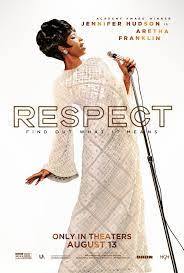Can anybody give it to you if you don’t have it?
By Ken Shelton
When I watched the movie Respect, the 2021 biographical musical story of R&B singer Aretha Franklin, Queen of Soul, I thought all those who hunger for respect deep in their souls. The film stars Jennifer Hudson as Aretha and follows the first three decades of Franklin’s life, from being born as a musical prodigy, losing her mother at age 10 to her arduous rise to international stardom, concluding with the live recording of her hit album Amazing Grace.
 The hit song “Respect“ was Aretha’s rearrangement of an Otis Redding song, and it became her signature song. Her version centers on the themes of human dignity and gender identity. In fact, Franklin’s interpretation became a feminist anthem. It is considered one of the best R&B songs of its era, earning Franklin two Grammy Awards in 1968. In 2021 it was placed #1 on the Rolling Stone list of “The 500 Greatest Songs of All Time”, perhaps because it is seen as a declaration of freedom from a strong woman who commands respect. The song has held up for 55 years as a feminist and civil rights statement. When asked once about her audacious stance, Franklin said, “I don’t think it’s bold. It’s quite natural that we all want respect—and should get it.”
The hit song “Respect“ was Aretha’s rearrangement of an Otis Redding song, and it became her signature song. Her version centers on the themes of human dignity and gender identity. In fact, Franklin’s interpretation became a feminist anthem. It is considered one of the best R&B songs of its era, earning Franklin two Grammy Awards in 1968. In 2021 it was placed #1 on the Rolling Stone list of “The 500 Greatest Songs of All Time”, perhaps because it is seen as a declaration of freedom from a strong woman who commands respect. The song has held up for 55 years as a feminist and civil rights statement. When asked once about her audacious stance, Franklin said, “I don’t think it’s bold. It’s quite natural that we all want respect—and should get it.”
RESPECT: What We All Want Most
Isn’t respect what we all want most? My friends at J2N Global, Bill Poole and Rick Cobb, remind me: If you plan to create a family or company, to bridge differences and to lead teams, you must build on the solid bedrock of respect.
“You show respect when you suspend assumptions because they won’t see what you see until you see what they see. So, you observe (absorb first, then project), listen (best way to communicate is to shut up) and inquire (you don’t know till you ask). Ask about their beliefs, backgrounds, experiences and ideas. The people who must implement plans should have input. Input involves inclusion and participation which build ownership and accountability.”
Bill writes: “The word respect comes from Latin respectre — meaning, to look again. Think about the word spect — as in spectacle, retrospect, spectrum, suspect, prospect, and inspect. Note that spect suggests looking into. So, respect means to look again or look into it again, as if wearing new spectacles, thus showing your respect or high regard.”
Show Respect: Shut Up and Listen
While it’s important to speak up and assert our ideas at times, it can be even more important to shut up, listen, observe and empathize—as modeled by Ernesto Sirolli, best known for his popular TED talk Want to Help Someone? Shut Up and Listen!
Sirolli asserts: “Greater impact and influence come with less talk, more listening, and keen, empathic observation.” He helps people to start and grow businesses. In fact, he’s helped launch more than 40,000 enterprises in 250 communities in 25 countries; and in the process has gained insight into what great entrepreneurs do well—and what it takes to succeed.
Once he worked for an Italian NGO striving for economic development in impoverished communities in Algeria, the Ivory Coast, Somalia, and Zambia. “Everything we touched, we killed,” he said. “Every project we did, every single one of them, failed.”
He described how his team decided to teach Zambians how to grow food in the beautiful fertile valley where they had lived as pastoralists, shepherding animals but planting nothing. The team imported seeds from Italy—tomatoes and zucchini— but the locals didn’t seem interested. The team tried to pay them money to plant, but there was little in the valley available for them to buy. Finally, the NGO started importing whisky and beer to coax locals into the fields.
“We kept thinking, what is wrong with these people?”
It soon became apparent. The tomatoes appeared on the vines, huge bursting fruits that put the most bountiful Italian crops to shame. The team was joyful, until one morning they awoke to find all the plants gone. Hippos had swarmed up from the river and gorged on them. The Italians ran to tell the Zambians what had happened.
“Of course,” said the people. “That’s why we don’t plant in the valley.”
“Why didn’t you tell us?” asked the Italians.
“Because you never asked,” they said.
“The experience was painful,” said Sirolli. “I thought we Italians were good people, and I wondered how we could fail so badly. So I looked at other projects done in Africa by the English, Americans, French— hoping to get ideas. And I realized: at least we had fed the hippos. Other million-dollar projects just left rubbish behind. Everywhere I saw the same problem: Our well-intentioned efforts failed because we didn’t listen to the people we were trying to help.”
Not listening shows a lack of respect, and no respect means no sustained success.
Show Respect: Boost Influence
Also, my friend Tim Clark reminds me: to assess your influence on others, you need to ask seven questions: 1) Presence: When you enter a room, what influence or impact does your presence have on the tone and tenor of meeting or conversation? 2) Collaboration: When you collaborate with others, does your influence accelerate or decelerate the speed of discovery and innovation? 3) Feedback: Does your influence increase fear and restrict the flow of feedback? 4. Inquiry: Does your influence draw people out by asking and listening or shut them down by telling? 5) Dissent: Do you encourage and reward dissent or do you discourage and punish it and then make bad decisions? 6) Mistakes: Do you celebrate mistakes and lessons learned or overreact and marginalize those who make them? 7) Unvarnished Truth: Are you willing to hear unvarnished truth, even when it’s unflattering, knowing that you need to hear it or suffer from willful blindness? Tim recommends finding a trusted friend or advisor who respects you enough to tell you the unvarnished truth and reveal blind spots.
Show Respect: Practice Empathy
My late friend and mentor Stephen R. Covey taught me much about listening, empathy and respect. In January 1984 I traveled with him to Palm Springs, California, where he made a presentation to Metropolitan Life executives: Empathy, key to understanding and influencing others. He taught the principle Seek first to understand and stressed the importance of valuing differences. “The key to influence is first to be influenced. It takes personal maturity and inner security to master the art of empathy.” He considered empathy to be the most valuable personal and professional skill because of the high cost of misunderstandings.
Covey taught that empathy means to capture and to reflect meaning and feeling. “When we rephrase content and reflect feeling, we listen with our eyes to capture the nature and the intensity of the emotion embedded in the communication.”
Empathy requires us to transcend seeing the world through our own frame of reference and to avoid four tendencies that are deadly to empathy: 1) Evaluating. Too often we evaluate and criticize as we listen which inhibits honest, open expressions or questions; 2) Probing. This invasive practice controls or directs the conversation and keeps sentiment from surfacing. 3) Advising. This suggests telling what another should do, think, or say before understanding is achieved. Diagnose (understand) before you prescribe (give advice). 4) Interpreting. We often try to explain other people’s behavior and guess their intention, projecting our motives on the behavior of others and judging others by their behaviors and ourselves by our intentions.
When we seek first to understand and practice empathy, we communicate that we care, we respect their ideas, we value the relationship, we accept them for who and what they are. People spend a great deal of time, money, effort and energy fighting for acceptance and respect. We grant them this when we sincerely seek to understand, knowing that it is in understanding and respecting them that we are best understood and respected.
Empathy means moving into the mind and heart of others to see the world as they see it. It does not mean that you feel as they feel—that is sympathy. It means that you understand how they feel, based on how they see the world. The key to you having influence with them is their perceiving that they have influence with you.
So, talk less, listen more. Prescribe less, diagnose more. Seek first to understand, then to be understood. Restate the opposing position to their satisfaction before you make your case! Get out of your head and into their head and heart. When you shift to this respect perspective, you achieve win/win agreements; you minimize conflict; and you maximize common ground.
 Ken Shelton is the author of hundreds of articles and several books, including Field Leadership (2020), and served as editor and publisher of Leadership Excellence magazine for 30 years. In 2015, he was recognized with the Business Leadership Excellence Award by the World Leadership Congress in Dubai, Arab Emirates
Ken Shelton is the author of hundreds of articles and several books, including Field Leadership (2020), and served as editor and publisher of Leadership Excellence magazine for 30 years. In 2015, he was recognized with the Business Leadership Excellence Award by the World Leadership Congress in Dubai, Arab Emirates



